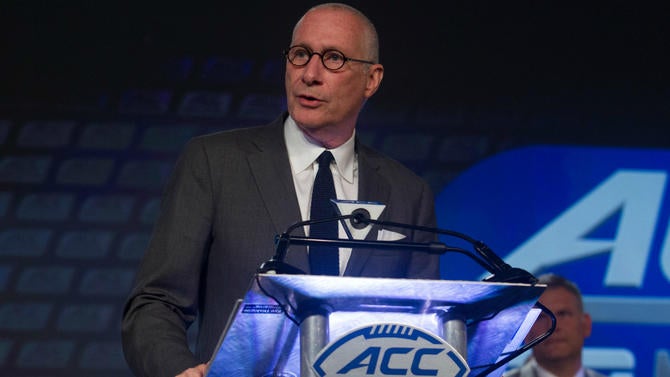CHARLOTTE, N.C. -- ACC commissioner John Swofford smiled and displayed a confused look when asked Thursday about the Big 12's statements that it's renewing expansion plans due to news ESPN is creating an ACC Network.
"I wasn't quite sure what to make of that, quite honestly," Swofford said. "It surprised me because I thought, 'I'm not sure what the connection is.' I haven't talked to (Big 12 commissioner Bob Bowlsby) so I don't know what their internal thinking is."
Oklahoma president David Boren said the ACC Network "indicates that we live in a very fast-changing world" and the Big 12 needs to be proactive. It was a complete reversal from Boren's comments a month earlier and ran counter to the idea many people in the Big 12 had that expansion would be tabled for now.
Perhaps being reactive now is better than nothing for the Big 12. But compared to the ACC, which made official Thursday its long-discussed plans for an ACC Network and locked in its members' media rights through 2036, the Big 12 still easily looks like the most unstable Power Five conference.
Who knows if the Big 12 will exist 10 years from now? The immediate reaction by several high-profile administrators in college sports to the Big 12 expansion reversal is that it looks like a money grab with no regard to long-term stability. By expanding, the Big 12 could contractually force ESPN and Fox to pay more money that the conference's existing members can pocket without immediate equal shares to its members, none of whom are considered really attractive TV options.
Then again, would there even be an ACC Network if ESPN didn't reportedly owe the conference $45 million by July 1 if there was no ACC Network agreement? The ACC and ESPN dodged that question Thursday over a report last spring from Raycom announcer Wes Durham.
"We enter into this agreement excited and happy to do it," ESPN president John Skipper said. "I'm definitely not going to comment on finances."
This much is clear: Even though the ACC Network isn't scheduled to launch as a linear channel until 2019, and even though ESPN could face distribution challenges, the ACC is better off today. Just four years ago, Florida State's board of trustees chairman openly criticized the ACC's new deal with ESPN through 2026-27 and talked about the Seminoles joining the Big 12. Clemson was also floated in media reports as a possibility for the Big 12. Then Maryland left for the Big Ten and the ACC seemed more vulnerable than ever.
"I never really was terribly concerned that any of that was going to happen, but just knowing that it could brought me some sense of uneasiness," Swofford said. "And that's why when Maryland left we decided it's time to have the grant of rights from the institutions, and the institutions agreed with that."
So here we are. Four of the Power Five conferences now have a television network. The Big 12 is once again on the outside looking in. Some questions and answers about the ACC Network:
What are the ACC Network details?
Starting next month, the ACC and ESPN will launch ACC Network Extra, a digital platform that will show 600 live events per year. The linear ACC Network channel is set to launch in 2019 and will eventually show more than 1,300 events per year across all platforms.
ESPN needed only about one year to launch the SEC Network. This time, ESPN is building in three years before launching the ACC Network, an indication of some of the challenges ahead for the channel to get picked up on main tiers by satellite and cable companies. Also, who knows what television will even look like in 2019?
The three-year lag time is due to planning for distribution, staffing and the end of some current licensing deals (such as Raycom), Skipper said.
"John Swofford did reference the continuing questions about the ACC Network," Skipper said. "We wanted to be good partners and go ahead and be definitive so we could put those questions to rest."
Skipper also noted ESPN will fully own the ACC Network, just as it does with the SEC Network. The ACC will get a new dedicated channel that's taken to the market for distributors, meaning it won't be a current ESPN-branded channel that changes into the ACC Network, Skipper said.
A decision on what city to house the network is expected in the next 12 to 18 months, Skipper said. Charlotte, a major hub for ESPN offices, is already home to the SEC Network.

How much will the ACC Network pay the league?
The ACC and ESPN are quiet on this question. The payout isn't expected to match what the SEC Network and Big Ten Network deliver. Those conferences have separated themselves financially from everyone else.
Tax records from 2014-15 (the most recent available) showed the SEC and Big Ten both paid its full-share members about $33 million each -- and that was before the Big Ten's new television deal. The ACC paid out about $27 million per school in 2014-15.
"We're behind a bit, but this is an opportunity that should -- and we expect -- to put us certainly in the same ballpark with (the SEC and Big Ten) going forward," Swofford said. "We'll have a bump in rights fees between now and the start of the linear channel, and then the channel gives us tremendous opportunity financially and from an exposure standpoint. We haven't looked at those projections with a pie-in-the-sky attitude. We've looked at it with a very moderate attitude and are very excited about where it can take us depending on distribution. If we knock it out of the park, it really puts us there."
What are the ACC Network distribution challenges?
The ACC has teams in nine states -- including some very heavily-populated areas -- that total about 29 million cable and satellite subscribers. The question with all of these conference channels is whether there's enough viewership demand to get the desired subscription rates, especially as more people cut the cord with cable and satellite TV.
So far, widespread distribution for conference television networks has largely been driven by football. The Pac-12 still can't cut a deal with DirecTV at the rate it wants. While the ACC currently has two elite football programs (Clemson and Florida State) and has been aided by a scheduling relationship with Notre Dame, the league doesn't have the rabid football fan base as the SEC or Big Ten.
The ACC is still a basketball conference. Duke, North Carolina, Louisville, Syracuse, Notre Dame and Virginia have all had national success in recent years. To that end, the ACC is increasing the number of conference men's basketball games from 18 to 20. The more games fans want to see, the more ESPN can get higher rates, and the more the ACC can get paid.
"I don't mean for this to sound arrogant, but I suspect ACC basketball is the most appealing college basketball in the country for fans to see and our basketball fans are incredibly rabid," Swofford said. "I think basketball will probably help us with distribution more than any other conference, but that certainly doesn't diminish the role of football."
Might there be a day when a Duke-North Carolina basketball game is on the ACC Network in order to drive distribution? ESPN owns all of the ACC's rights so it's certainly possible. When ESPN2 was trying to get off the ground in 1998, the network aired Duke-North Carolina and set a viewership record at the time for the channel.
"I got a lot of hate mail, it wasn't e-mail back then," Swofford said. "It was handwritten letters and phone messages: 'We can't watch the game.' Well, the answer is you better get ESPN2. That's kind of a much smaller experience that you could relate to how you might approach a channel."
Will the ACC play more conference football games?
It's been discussed off and on for years. At one point, the ACC was set to add a ninth conference game a couple years ago, but the plan was scrapped when Notre Dame agreed to play five ACC teams per season.
ACC coaches are largely against nine games. Several said Thursday they don't want to take away games from FCS opponents who need the paycheck. Swofford said the number of ACC games could be revisited again, but doesn't know for sure. ESPN seems interested in the idea.
"Clearly we value the conference playing games against conference opponents," Skipper said. "We're working with the ACC to make sure that we're all happy with the quality of the football overall. It's a tough conference. They are committed to playing a lot of tough out-of-conference games and we'll work with them on trying to continue to enhance the schedule."

As TV viewing evolves, why would ESPN do an ACC Network?
Besides the reported $45 million clause to launch a network by July 1, ESPN is paying for 20 years' of media rights and stability with the ACC at 2016 rates. This is another sign ESPN continues to believe in the value of live sporting events.
"I believe sports rights will continue to be the most valuable content, and I think they will continue to appreciate in value," Skipper said. "We wouldn't do a deal through '35-36 if we didn't believe that, and we do strongly."
The ACC's extension of its grant of rights nine years gives ESPN peace of mind. The grant of rights agreement is intended to guarantee that a school's media rights and revenue remains with the ACC even if the school changes conferences. No school has legally challenged whether grant of rights agreements are enforceable, but it's widely viewed within the college sports industry as binding.
"For the ACC, it creates stability. For us, it creates stability and we like that," Skipper said. "We've never had any interest in this business of schools moving around from one conference to another. That's the business of the conferences, not ours."
ESPN hasn't shown interest in a Big 12 Network, which would be complicated by whether Texas wants to roll the Longhorn Network into such a channel and extend its grant of rights with the Big 12 beyond 2024. Skipper declined to comment on discussions with the Big 12.
"Our job we think is to work with each one of our league partners to create the best possible situation we can for them," Skipper said. "We value the content for all of these leagues, including the Big 12, and I'm going to mostly today talk about the ACC and not the Big 12."
What can the Big 12 learn from the ACC?
The ACC survived by making several planned moves over a lengthy period of time, even as these changes totally shook up the conference as everyone knew it. First, Miami, Virginia Tech and Boston College joined the ACC more than a decade ago to help football and get into bigger markets.
Later, the ACC did a course correction to help basketball by adding Syracuse and Pittsburgh. When Maryland left, Louisville became a quality replacement that the Big 12 rejected. Notre Dame's scheduling partnership in football added value, not to mention the Fighting Irish being an ACC member in all other sports. Finally, the grant of rights agreement after Maryland left signaled long-term security for the ACC. Swofford pinpointed 2009 as the first time he started exploring an ACC Network.
"I think you've got to have a network," Duke athletic director Kevin White said. "I think you need the visibility, you need the platform, you need the financial stability that comes with that. These broad-based programs come with real costs. It does impact recruiting, particularly in Olympic sports. Your brand gets enhanced."
The ACC planned for this day and managed to corral all of its members on board for a long-term vision. That's why the ACC celebrated Thursday as the Big 12 continues to react.





















